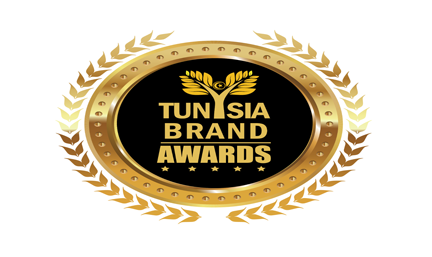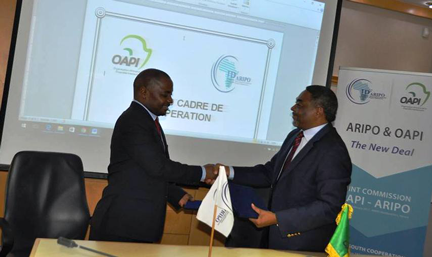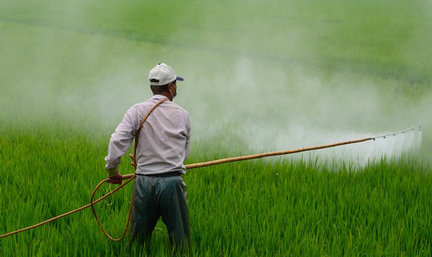

Tunisia Brand Awards2017-02-27
For the first time in Tunisia, Trademark will top the landscape by organizing the first session of the Competition for trademark in Tunisia (Tunisia Brand Awards - TBA). So far about 616 brands registered in this contest. Noting that this competition will be done in 3 phases starting from February 22 till April 8, 2017.For the first time in Tunisia, Trademark will top the landscape by organizing the first session of the corresponding for trademark in Tunisia (Tunisia Brand Awards- TBA) Attribution of ""First of the Year Award for the trademark.""
In this context, was organized on Monday, 30 January 2017 press conference to introduce this debate. this debate within the framework of partnership between the public and private sectors In collaboration with the National Institute of Standards, Industrial Property and the Centre for the Promotion of Exports, Industry Promotion Agency and restoration; and under the Tunisian Union of Industry and Commerce. Trademark counterparts in Tunis (Tunisia Brand Awards- TBA) will be annual event for competition among all domestic trademarks and foreign in the Tunisian market, and a reference to several indicators, which is the trademark reputation in the Tunisian market and consumer confidence. Also, this debate will lead to the culmination of a series of marks as ""the Year award first trademark"" for the efforts made over the past year, and particularly with regard to consumer satisfaction. To better assess trademarks: Consumer Privacy in front of society, branding is working hard in order to satisfy the consumer and search for new markets. From this point came the idea of trademark Award in Tunis, which will contribute to the field of providing greater inter-trademark competition in the Tunisian market as well as upgraded in the international rankings.

OAPI and ARIPO Sign New Cooperation Agreement 2017-02-21
The African Regional Intellectual Property Organization (ARIPO) and its sister organization, The African Intellectual Property Organization (OAPI), signed a four year Cooperation Agreement on February 09,2017 at the ARIPO headquarters in Harare, Zimbabwe. This Agreement, which is envisaged to take the relationship of the two organizations to new heights, abrogates two earlier agreements signed by the two organizations in 1996 and 2005 respectively.
The African Regional Intellectual Property Organization (ARIPO) and sister organization, Organisation Africaine de la Propriété Intellectuelle [African Intellectual Property Organization] (OAPI), signed a four year Cooperation Agreement on 09 February 2017 at the ARIPO headquarters in Harare, Zimbabwe. This Agreement, which is envisaged to take the relationship of the two organizations to new heights, abrogates two earlier agreements signed by the two organizations in 1996 and 2005 respectively.
The new Agreement establishes a comprehensive cooperation framework in intellectual property matters for the two parties. In the new Agreement, OAPI and ARIPO have agreed to: work towards the harmonization of their systems; exchange documentation and technical information; mutually cooperate in the development of training and joint capacity building programs including in user awareness. The agreement also requires that either party offers technical assistance to the other when such assistance has been requested for. Importantly too, OAPI and ARIPO agreed to take common positions on major IP issues affecting the Member States of the two organizations at continental and international levels.
Directors General Dr. Paulin Edou Edou of OAPI and Mr. Fernando dos Santos of ARIPO signed the agreement on behalf of their respective organizations.
To operationalize the Agreement, OAPI and ARIPO have jointly developed and adopted a biannual work plan for the period 2017 – 2018 that sets out specific aspects of collaboration and itemized activities to be pursued in the different areas of cooperation with agreed details on expected results, their coordination and administration as well as the timelines.
A joint commission established by the two will meet annually to assess the level of implementation of those agreed biannual work plans.

The Economic Cost of IPR Infringement in the Pesticide Sector2017-02-08
"On February 8, 2017, the European Observatory on Infringements of Intellectual Property Rights (Observatory) published its tenth sectorial study on the impacts of counterfeits in the pesticide and agrochemical sector. The Observatory, based at the European Union Intellectual Property Office (EUIPO) in Alicante, Spain, works to provide evidence-based data on the impact of intellectual property on the economy of the European Union (EU) as well as on its role and public perception.
The Observatory previously published sectorial studies on the following: cosmetics and personal care; clothing, footwear, and accessories; sports goods; toys and games; jewelry and watches; handbags and luggage; recorded music; spirits and wine; and pharmaceuticals. The Observatory's tenth sectorial study analyzes the negative impact of counterfeiting on businesses, governments, and consumers and highlights two case studies where counterfeit pesticides were seized.
Some highlights of the study include:
The biggest producer of pesticides in the EU is Germany, with € 4 billion in sales, followed by France, with € 3.5 billion in sales, with an estimated loss of 500 jobs per year in both countries.
The total lost sales in the pesticides sector in the United Kingdom is estimated at € 76 million each year, with an estimated 200 jobs lost.
The EU pesticides industry consists of more than 600 enterprises, with an average of 35 workers per firm.
The direct estimate of sales lost by legitimate manufacturers of pesticides in the EU is € 1.3 billion.
Total lost taxes on the counterfeit products is estimated to be € 2.8 billion."

Madrid Goods & Services Manager Aligned with Latest Nice Classification Edition2017-02-05
"Last month Madrid Goods & Services Manager introduced several key updates, including over 1000 new terms and alignment of the database with the 11th edition of the Nice Classification.
(ISTOCKPHOTO.COM/WUTWHANFOT)
Before filing an international trademark application, the goods and services to be covered by the mark need to be determined. Madrid Goods & Services Manager helps users compile and verify their list of goods and services by providing access to an extensive collection of terms and descriptions—including the Nice Classification’s current alphabetical list, as well as a number of terms pre-approved by WIPO and 29 countries and regional IP Offices.
With the addition of over 1000 new pre-approved terms, the updated Madrid Goods & Services Manager provides users with an even larger, more precise set of options, offering greater flexibility and reducing the risk of refusals based on an unacceptable list of goods and services.
Over 1300 new terms
The Madrid Goods & Services Manager database includes the current Nice Classification, as well as other terms approved by WIPO and many IP Offices around the world. In addition to the 324 new terms PDF, NCL11-2017 main changes and MGS alignment introduced by the 11 th edition of the Nice Classification, the updated database also contains over 1000 additional new terms pre-approved by WIPO.
As a result of these updates, the database now offers over 61,000 English-language descriptions of goods and services for selection, as well as over 26,000 WIPO-approved English terms for those users who prefer to compile their list using the free-text entry function.
Modified class headings and explanatory notes
The new Madrid Goods & Services Manager fully integrates all modifications to 15 Class Headings and 22 Explanatory Notes introduced in the 11 th edition of the Nice Classification, including the notable transfer to Class 21 of all types of serving utensils.
Class transfers
The transfer of serving utensils was just one of many class transfers introduced by the 11 th edition of the Nice Classification, in conjunction with several additions, deletions and rephrased headings.
Also transferred to Class 21 were nutcrackers, and crab and lobster crackers, among others. Due to the re-categorization of mortars and pestles based on use, suribachi [Japanese-style earthenware mortars] and surikogi [Japanese-style wooden pestles] intended for kitchen use were also transferred to Class 21.
As a result of several distinctions introduced in headings related to medicated versus non-medicated goods, a number of terms have been moved from Class 3 to Class 5. These include medicated shampoos, soaps, toothpastes, dentifrices, hair lotions, antibacterial soaps, hand washes, disinfecting soaps and disinfectants, and germicidal detergents.
A number of other Classes were affected PDF, NCL11-2017 main changes and MGS alignment by transfers, which have all been reflected in the latest edition of the Nice Classification.
Participation by Canada
Madrid Goods & Services Manager now offers users the opportunity to check whether their list of terms (including those from the Nice Classification’s alphabetical list) will be accepted by the Canadian Intellectual Property Office, an Office that does not currently participate in the Madrid System. The country has indicated plans to join the System in the coming years, but with information displayed in the database ahead of Canada’s accession, users can use the tool when filing trademark applications directly with the Canadian Office until such time as Canada becomes an official member of the Madrid System.
Benefits of Madrid Goods & Services Manager
The database offers a number of invaluable features and content designed to support users in compiling an acceptable list of goods and services for their international trademark application.
Multilingual - All database content—including Help and FAQ pages—is available in the three official Madrid System filing languages (English, French and Spanish), as well as 15 additional languages: Arabic, Chinese, Dutch, German, Hebrew, Italian, Japanese, Korean, Mongolian, Norwegian, Portuguese, Russian, Serbian, Turkish and Ukrainian.
Full alignment with current Nice Classification – All Classes, Class Headings and terms from the alphabetical list of the Nice Classification are provided in 18 different languages. (Translations are based on transfers and changes carried out in the two official languages of the Nice Classification, i.e. English and French.)
Explanatory Notes in 18 languages, to help users determine the correct classification of terms not found in the Nice Classification’s alphabetical list.
Search by Nice Classification “indication basic number” – The database allows users to search by Nice Classification basic number, the number officially attributed to each item (a.k.a. “indication”) in the alphabetical list of goods and services.
28 participating Madrid System members and Canada – The number of Madrid System Contracting Parties participating in the Madrid Goods & Services Manager continues to grow—and with Canada’s recent participation, this figure is likely to increase in the coming years.
“Check acceptance” features – To help reduce the risk of irregularities and provisional refusals caused by errors in the list of goods and services in an international application, the database offers specialized features that permit users to check whether or not a term will be accepted by WIPO (using the “Check acceptance by WIPO” feature), as well as whether terms accepted by WIPO will also be accepted by a member’s IP Office (using the “Check acceptance by dCP” feature).
Similar group codes - Some countries have developed coding systems to facilitate trademark searches through the use of “similar group codes”. (Similar group codes are also used in some IP Offices during the examination process.) Users of Madrid Goods & Services Manager can now access national “similar group codes” for the IP Offices of Japan (JPO) and of the Republic of Korea (KIPO), which were the first IP Offices to communicate these codes to WIPO.
About Madrid Goods & Services Manager
Madrid Goods & Services Manager is a multilingual e-service that helps you compile the complete list of goods and services required to file an international trademark application. It provides terms from the alphabetical list of the Nice Classification, as well as many other terms that have been pre-approved by WIPO, Canada, and 28 IP Offices under the Madrid System. Using pre-approved terms helps reduce delays and costs linked to irregularity notices and provisional refusals. The Madrid Goods & Services Manager database is available in 18 languages, including the three official languages of the Madrid System (English, French and Spanish)."